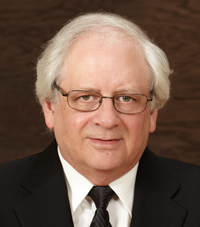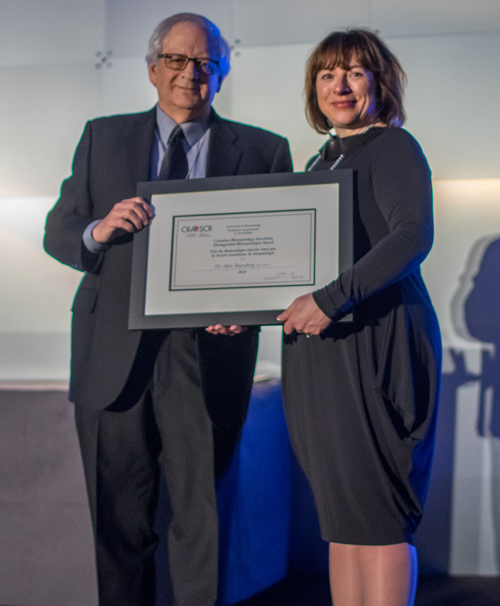Summer 2018 (Volume 28, Number 2)
Distinguished Rheumatologist:
Dr. Alan Rosenberg
Download PDF

Why did you become a rheumatologist? What or who influenced you along the way to do so?
As a medical student and pediatric trainee, I was startled each time I encountered a child with a rheumatic disease. Despite the dedicated care of many, it seemed that those children, debilitated by deformity and pain and whose afflictions were so poorly understood, deserved more. It was children afflicted with rheumatic diseases and their families, from whom I had the privilege of learning, who captivated and inspired my interest in pediatric rheumatology. I completed my pediatric residency at the University of Manitoba, fortuitously arriving there at the same time as Ross Petty. Ross, also a University of Saskatchewan graduate, after completing his pediatric and pediatric rheumatology training in Ann Arbor, returned to Canada to become this country’s first formally trained pediatric rheumatologist. Ross’s astute and compassionate patient care, his excellence in teaching, and his visionary and creative innovations were powerful influences that reinforced my passion for the discipline.
At the time I completed my training, there were many who believed that the discipline of pediatric rheumatology was unnecessary and silly. The late Dr. Don Mitchell, an adult rheumatologist at the University of Saskatchewan, thought otherwise. Don recognized that children and their diseases differed from adults in important ways and cajoled the Department of Pediatrics to recruit a pediatric rheumatologist. He was a memorable mentor during my formative medical school training and was influential in my returning to Saskatchewan.
The members of the Canadian pediatric rheumatology community are distinguished by an uncompromising commitment to the well-being of patients, to preparing the next generation of care providers, and to advancing knowledge through collaborative and creative research. So many of my pediatric rheumatology colleagues, too many unfortunately to mention by name, have been sources of inspiration, knowledge and wisdom.
What do you foresee as challenges to Canadian pediatric and adult rheumatologists in the future and what can individual rheumatologists and the CRA do to meet these challenges?
Recent progress in both pediatric and adult rheumatology has been dramatic. We have our patients and families to thank for inspiring and contributing to this progress. Still, however, we are fundamentally far away from understanding these diseases. We do not know their causes, our understanding of their pathogeneses is still rudimentary, our treatments while dramatically better are still not as predictably effective or as safe as we desire, and we have no insight into cure and prevention. However, I believe that we are on the brink of a wondrous era of discovery, propelled by collective creativity and ingenuity and by astonishing new technologies that will expose the biologic, social, lifestyle, and environmental factors that conspire to produce disease. Achieving these transformative discoveries will be possible only by forging alliances with collaborators from an eclectic array of disciplines who will devise rationally-conceived and realistically achievable strategies for rheumatic disease cure and prevention.
As rheumatologists we must continue to accept the challenge to advocate with uncompromising vigour on behalf of our patients for the resources they deserve. As individuals and collectively through associations such as the CRA, we must advance the case that investing in rheumatic disease care, education and research will result in improved outcomes at lower patient, family and societal costs.
Our Canadian indigenous communities continue to be disproportionately burdened with rheumatic diseases. Effectively contending with the disturbing disparity in health and healthcare for many indigenous peoples with rheumatic diseases remains a challenge. We must begin to engage more effectively with our indigenous communities and be guided by their wisdom and perspectives. Enticing young indigenous youth to pursue careers in healthcare in general and rheumatology in particular should be an important step to effective engagement and improved health.

Dr. Alan Rosenberg receiving his award from Dr. Joanne Homik.
What are the most important ideas which pediatric rheumatologists should impress on their adult rheumatology colleagues?
There is almost no disease that does not begin before it begins. That is to say, the origins of almost all disease, especially chronic diseases such as rheumatic diseases, have their origins long before the disease becomes overtly manifest. There is compelling and in many cases irrefutable evidence that the origins of those diseases is during childhood or prenatally. To improve and personalize patient care and to cure and prevent rheumatic diseases we must begin to invest more thoughtfully and vigorously in understanding the very earliest genetic, social, environmental, and lifestyle factors that influence rheumatic disease occurrence and outcomes.
As pediatric rheumatologists, we must be more attuned to our patients’ long-term, adult outcomes so that we can effectively judge the future consequences of the interventions we choose for our pediatric patients. Promoting more cohesion between adult and pediatric rheumatologists will help optimize our pediatric patients’ transitions to adulthood care and their long-term disease outcomes.
What do you most enjoy about living and working in Saskatchewan?
I was fortunate to return to Saskatchewan after my training. Although we had not anticipated remaining in Saskatoon for more than a few years we are, decades later, still happily ensconced in a thriving, vibrant, progressive community that teems with cultural and recreational activities. The academic environment is hugely supportive and is imbued with a powerful culture of collaboration. Having all the health sciences disciplines within the University campus and access to internationally renowned research facilities such as the Canadian Light Source offers unique opportunities for mingling with renowned scientists and unique technologies.
The warm, respectful prairie spirit is reflected in the colleagues with whom I work and the patients and families we have the privilege of serving.
Alan Rosenberg, MD, FRCPC
Professor,
Division of Pediatric Rheumatology
Department of Pediatrics
University of Saskatchewan
Saskatoon, Saskatchewan
|
